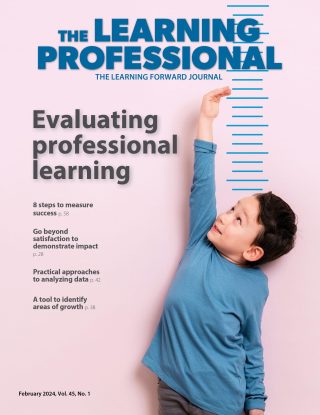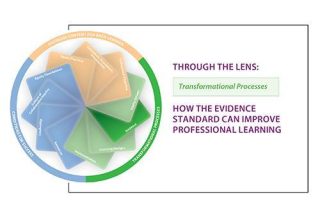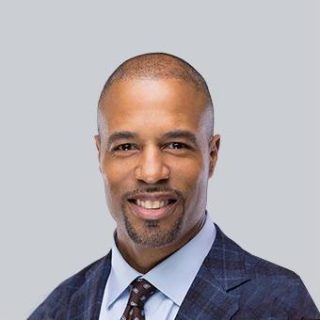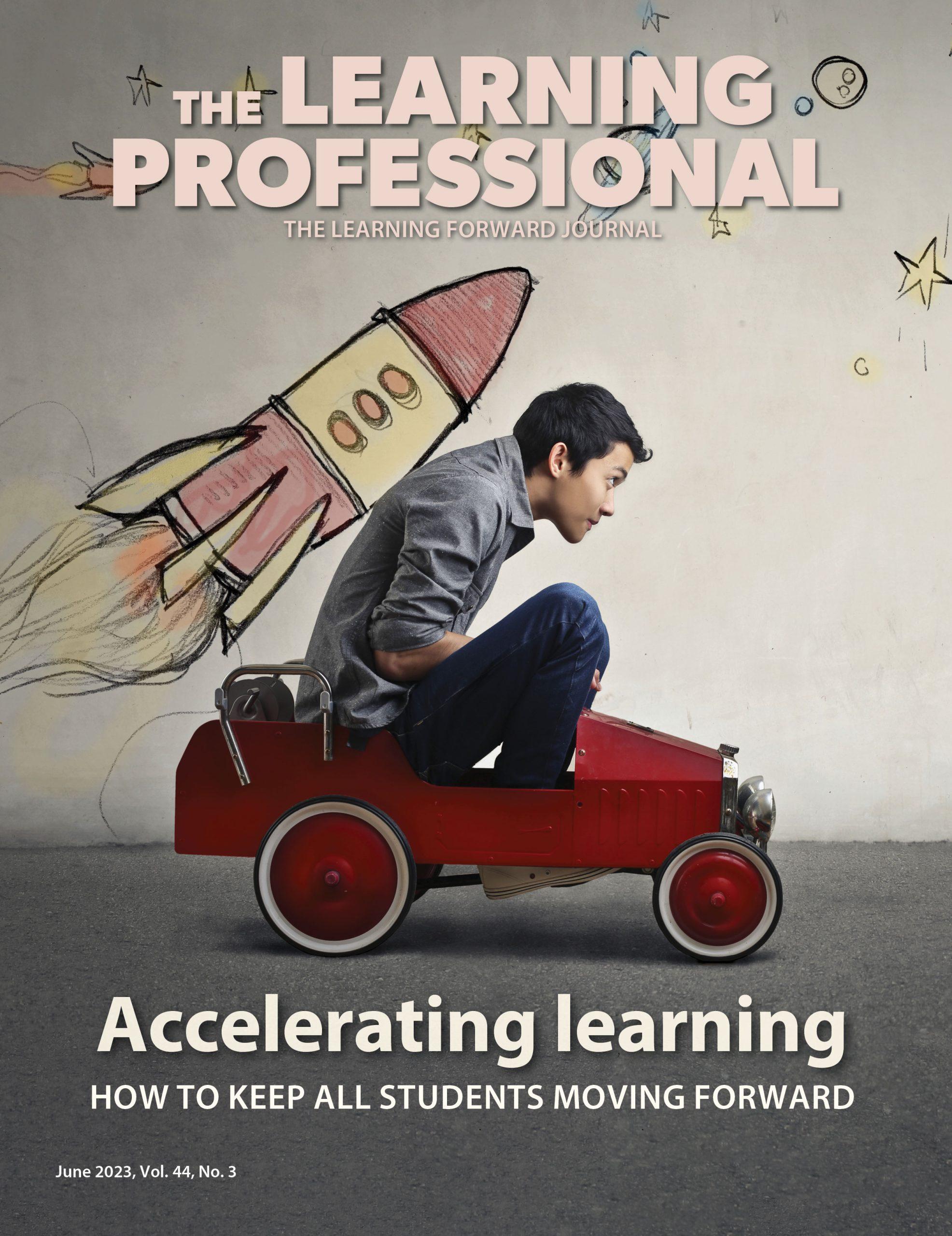CALL TO ACTION
Principals, are you leading schools where teachers want to stay?
By Frederick Brown
Categories: Change management, Leadership, Standards for Professional LearningFebruary 2023
I was a building principal more than 25 years ago, and I’ll be the first to admit that schools have changed a great deal since then. There was no TikTok or Instagram for teachers to compete with, and the thought of students bringing cellphones to school never crossed our minds. But some things haven’t changed for educators, including this fact: Teachers who feel appreciated and supported are more likely to stay in the job and the profession.
Principals have always played a key role in that equation. As the authors of the report How Principals Affect Students and Schools (Grissom et al., 2021) pointed out, effective principals are skillful at retaining effective teachers, in part because they build strong relationships with teachers and build a productive school climate where the focus is on instruction. I would also argue that effective principals use professional learning to strengthen teachers’ understanding of and commitment to school goals and initiatives and to build their expertise in ways that entice teachers to want to stay in their school or district.

Leveraging professional learning in this way requires intentionality, and Standards for Professional Learning (Learning Forward, 2022) offer significant guidance for leaders. The standards didn’t exist in their current form when I was a principal, but as I reflect on my own practice, I feel I was living them in spirit. I believe three standards in particular contributed to high levels of teacher retention in my school.
Professional Expertise: Professional learning results in equitable and excellent outcomes for all students when educators apply standards and research to their work, develop the expertise essential to their roles, and prioritize coherence and alignment in their learning.
Although some people view expertise like earning top-tier status on their favorite airline — once it’s achieved, nothing more needs to be done — I never thought of it this way. As the standard makes clear, educators need to pay attention to new research and emerging best practices to achieve and maintain expertise. I believe that authentic experience of expertise was vital for the teachers in my school.
Expertise without implementation, however, is like a fancy car that doesn’t go anywhere. It’s not enough to be an expert if the students don’t benefit. In my building, I believe our focus on implementation also contributed to my staff’s success.
Implementation: Professional learning results in equitable and excellent outcomes for all students when educators understand and apply research on change management, engage in feedback processes, and implement and sustain professional learning.
More than once during my principalship, the district or school administration introduced new curricula, instructional materials, or expected practices. Sometimes it felt like we were in a constant state of change, and that can be frustrating for teachers. However, when managed intentionally and effectively, the change process can create even stronger commitment among the staff. One way to do this is by honoring and addressing teachers’ concerns. I also worked with my staff to put our own mark on new strategies and resources in a way that incorporated their voices and benefited students and our building’s culture. As a result, teachers felt the professional learning or change was something that was being done with them, not to them.
The third standard — Leadership — may seem an obvious choice, but it’s helpful to understand how it contributes to teacher retention.
Leadership: Professional learning results in equitable and excellent outcomes for all students when educators establish a compelling and inclusive vision for professional learning, sustain coherent support to build educator capacity, and advocate for professional learning by sharing the importance and evidence of impact of professional learning.
This standard applies to a broad range of individuals across the education system, including those who do not have the word “leader” in their titles. I was not the only leader in my building. Grade-level chairs, content experts, and even students saw themselves as leaders and as part of creating and maintaining the vision of collective efficacy and mutual success. As a result, they not only felt a sense of loyalty and a desire to see the changes carried through, they also could see a long-term career path for themselves.
I take pride in the way my staff and I collaborated to grow and improve and that we had high levels of retention and satisfaction. This is a reflection of everyone’s hard work and intentional commitment, not just mine. But I understood — and welcomed — the responsibility I had to create the conditions for that culture to grow.
As Jason Grissom and colleagues stated in their report, “Principals who are successful at retaining teachers take a proactive approach and focus on teacher growth, including building opportunities for teachers to collaborate.” I encourage all school leaders to take that message to heart.
Download pdf here.
References
Grissom, J.A., Egalite, A.J., & Lindsay, C.A. (2021). How principals affect students and schools. The Wallace Foundation.
Learning Forward. (2022). Standards for Professional Learning. Author.
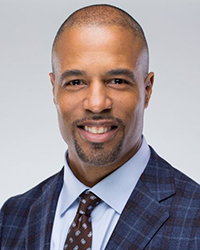
Frederick Brown is Learning Forward’s president | CEO. Fred is an education visionary who knows firsthand that our nation’s schools need transformational change if we are to meet the challenges of the next decades. Fred advocates that every child deserves to reach their highest potential and every educator must have the opportunity to participate in exemplary, ongoing, professional learning programs to provide students the skills needed to meet their unique needs.
Supporting educators at all levels and improving student achievement are through lines of Fred's career. An elementary school teacher, a middle school assistant principal, and school principal, Fred saw firsthand the impact high-leverage instructional practices and school culture have on school success.
Fred is a frequent speaker on leadership and building high-quality learning in schools. He has co-authored two books that have made significant contributions to the field of education, demonstrating how a comprehensive approach to professional learning can be achieved so that everyone in a system is a learner, and how principals apply a learning lens to their many critical responsibilities to create a productive climate for learning and collaboration. "Becoming a Learning System" and "The Learning Principal -- Becoming a Learning Leader" are time-tested Learning Forward resources for schools and leaders.
Categories: Change management, Leadership, Standards for Professional Learning
Recent Issues
TAKING THE NEXT STEP
December 2023
Professional learning can open up new roles and challenges and help...
REACHING ALL LEARNERS
October 2023
Both special education and general education teachers need support to help...
THE TIME DILEMMA
August 2023
Prioritizing professional learning time is an investment in educators and...
ACCELERATING LEARNING
June 2023
Acceleration aims to ensure all students overcome learning gaps to do...


